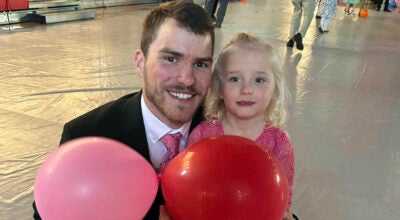Treatment in sight from Carly’s Law study
Published 10:13 am Monday, June 2, 2014

Dustin Chandler, right, with chair of the UAB Neurology Department Dr. David Standaert, left. (Contributed)
By MOLLY DAVIDSON / Staff Writer
PELHAM—Alabamians suffering from epilepsy and rare seizure disorders may be able to receive experimental cannabidiol, or CBD oil, treatment as early as this fall, thanks to research made possible by Carly’s Law.
“They have a plan in place to expedite the regulatory application process,” Pelham Police officer Dustin Chandler, one of the driving forces behind the passage of Carly’s law, said after a recent meeting with the UAB CBD oil research team. “UAB is really excited, this is a huge opportunity for them to research something they haven’t been able to before.”
Senate Bill 174, also known as Carly’s Law after Chandler’s daughter, Carly, who suffers from rare neurological seizure condition CDKL5, was signed into law by Governor Robert Bentley on April 1 after unanimous approval by the State Legislature.
Carly’s Law calls for the clinical study of CBD oil, derived from the cannabis plant, for the treatment of severe seizure disorders in individuals for who other treatments have failed. The law also allots $1 million for research at UAB.
“It will be an open label observational study,” Chandler explained. “There are no plans to limit the number of patients they’re trying to treat… (UAB is) expecting a large number of people.”
Although the study looks to encompass a wide number of people, Chandler noted there are limitations. A patient must first receive doctor approval to gain entrance into the study. Once in the study, the patient must go to UAB to receive CBD medication.
“The medicine will be dispensed at UAB,” Chandler said, explaining the CBD oil will be held there for “safe-keep.”
Although Carly’s Law allows the study of CBD oil for the treatment of seizure disorders, many medical professionals believe it has the potential to treat a number of conditions, including PTSD, schizophrenia and even certain cancers.
“This is the first time (UAB) has ever been able to look at this kind of medicine, it’s uncharted territory,” Chandler said.
Although the possibilities for CBD oil are exciting, Chandler and countless other families and individuals impacted by severe seizure disorders are looking forward to beginning the study.
“There are people suffering every day,” Chandler said. “The number one question is when we can get the medicine.”









